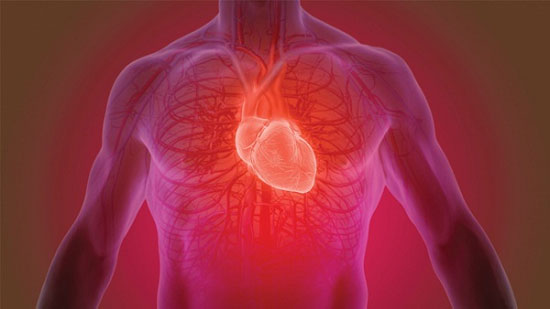nCoV attacking the body can cause acute and chronic heart damage, leading to various cardiovascular complications after recovering from Covid-19.
Cardiovascular Complications Post Covid-19
Master, Doctor Tran Thi Tuyet Lan (specializing in Cardiology, Ho Chi Minh City Heart Institute) stated that common cardiovascular injuries post Covid-19 include: myocarditis, myocardial fibrosis, endothelial dysfunction and vasculitis, thromboembolism, and arrhythmias.
Statistics from Gia Dinh People’s Hospital from December 1, 2021, to January 10, 2022, show that 140 patients experienced cardiovascular issues post Covid out of a total of 1,021 patients examined, accounting for 13.7%.
Myocarditis
nCoV infects host cells through the angiotensin-converting enzyme 2 (ACE2) receptor, leading to pneumonia caused by Covid-19; simultaneously causing acute heart damage such as myocarditis, chronic damage to the cardiovascular system like myocardial fibrosis, vasculitis, thromboembolism, and arrhythmias.

Symptoms of myocarditis can range from mild to severe.
“Direct heart damage caused by nCoV and indirectly by the cytokine storm leads to inflammation, necrosis of heart muscle cells, resulting in myocarditis and consequently heart failure,” Dr. Tuyet Lan shared.
Symptoms of myocarditis can range from mild to severe, including fatigue, shortness of breath depending on the level of heart failure, rapid heartbeat, and chest pain. Echocardiography shows enlarged heart chambers, reduced heart wall motion, decreased left ventricular ejection fraction, and pulmonary artery hypertension. Blood tests reveal elevated cardiac enzymes and increased heart failure biomarkers.
Myocardial Fibrosis
Dr. Lan indicated that localized or diffuse myocardial fibrosis in Covid-19 patients can be found even in asymptomatic individuals. A 45-year-old female patient exhibited diffuse myocardial fibrosis with symptoms of palpitations and chest pain three months after contracting Covid-19, despite having no history of myocarditis. Similar diffuse fibrosis signs were also noted in a 49-year-old male patient who experienced shortness of breath six weeks after symptom onset. Myocardial fibrosis contributes to left ventricular dysfunction leading to heart failure.
Arrhythmias
As heart failure progresses, it can lead to dangerous arrhythmias such as ventricular tachycardia, ventricular fibrillation, and potential cardiac arrest. Additionally, the side effects of antiviral drugs, antibiotics, hypoxemia, and electrolyte imbalances further exacerbate existing arrhythmias. Common arrhythmias include atrial fibrillation, non-sustained ventricular tachycardia, cardiac arrest, and bradycardia. Notably, atrial arrhythmias are more common in severely ill patients treated in ICU (Intensive Care Unit).
Thromboembolism
The process of endothelial cell damage and vasculitis caused by nCoV increases the risk of thrombus formation (blood clots) within blood vessels, leading to thromboembolic events. The presence of thrombosis increases the severity and mortality rate of the disease. Thromboembolic events are also commonly observed in critically ill Covid-19 patients, especially those in the ICU on mechanical ventilation, prolonged immobility, and venous stasis.
According to Dr. Lan, thromboembolism in dangerous locations can lead to sudden death, such as pulmonary embolism and acute myocardial infarction. Symptoms indicating this condition include palpitations, fatigue during exertion, shortness of breath, chest pain, and elevated cardiac enzymes. Depending on the suspected diagnosis of pulmonary embolism or acute myocardial infarction, patients may be referred for contrast-enhanced Multi-Slice CT (MSCT) of the pulmonary arteries or coronary angiography. This allows doctors to implement appropriate and timely anticoagulation treatment based on the underlying cause, helping to reduce mortality rates.
Endothelial Dysfunction and Vasculitis
Direct infection of the virus into endothelial cells via the ACE2 receptor leads to endothelial dysfunction and disrupts the integrity of blood vessels, causing vascular leakage. Moreover, according to Dr. Lan, the inflammatory process and hypercoagulability are also complications of endothelial dysfunction in patients with Covid-19.
Individuals with endothelial dysfunction show a 6% reduction in flow-mediated vasodilation. A 1% decrease in flow-mediated vasodilation correlates with a 13% higher risk of cardiovascular events.
Dr. Lan advises that post Covid-19 patients should always pay attention to their bodies. If they experience fatigue, shortness of breath, palpitations, rapid heartbeat, dizziness, or fainting, they should seek medical attention promptly for necessary tests such as electrocardiograms, echocardiograms, and lower extremity venous ultrasounds to detect deep vein thrombosis… for timely diagnosis and treatment.
Upon detecting thrombosis, depending on the level of increased D-dimer and the presence of lower extremity venous thrombosis, doctors will prescribe anticoagulants according to appropriate dosages and durations. If heart failure symptoms are present, patients will be treated with medications to improve heart failure, reduce shortness of breath, swelling in the legs, and monitor the improvement of myocarditis with medical treatment. Antiarrhythmic medications suitable for each type of arrhythmia will also be carefully considered.

















































